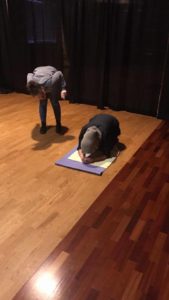
Student actresses in “Tunnel of Oppressions” act out discrimination against religion during the Tunnel of Oppression in 2017. Photo taken by Amber Degree.
There are many different kinds of discrimination that every student at Western may not experience themselves. The Tunnel of Oppression is an interactive tour that takes participants through an array of troubling scenes lasting 20-30 minutes. On Feb. 19 and 20 the Department of Intercultural Affairs provided over 600 students and faculty the opportunity to experience some of the most prevalent types of discrimination in this country.
These scenarios are acted out live and provide a realistic depiction of modern day discrimination. The room-by-room walkthrough included a handful of pressing topics such as kneeling during the national anthem, police brutality, school shootings, immigration border camps, sex trafficking, LGBTQ rights, and mental health.
Intercultural Affairs Volunteer and sophomore, Cherokee Rebello, thinks this is important for WCU students to attend. She explained that the issues they are covering have been going on for years. Many kids do not get exposed to these problems and she wants them to learn from this.
“To think before you speak, think before you judge, and think before you make comments to others because you never know what they’re going through,” Rebello said.
Tunnel of Oppression allows you to watch first–hand how these problems affect people. It creatively encourages attendants to experience what minorities face that they may not. The sign hanging above the door when you reach the end reads “At Least You Can Leave,” reinforcing the fact that these issues are simply reality for many minorities and other marginalized groups. It is skillfully constructed to enable students and faculty to obtain a new perspective.
Gabby Davis, a senior who has attended this event for three years, believes Tunnel of Oppression can make a difference.
“You have to educate yourself. You have to educate others. You have to educate communities. Without the education no one knows any better and you can’t have the right kind conversation in the first place,” Davis said.
After participants complete the Tunnel of Oppression they are guided to The Room of Hope. Here, a professional counselor discusses the tour with each group, allowing you to reflect on what you learned, how it made you feel, and what you can do about it. Assistant Director of Leadership within Campus Activities, Leslie Cavin, has been a counselor for Tunnel of Oppression before and believes in its ability to promote awareness.
”The issues that we’re tackling this year are so prevalent within our student population. Being showed this stuff right to your face allows you to go out and be an advocate which is what these minority populations need,” Cavin explained.
This year Cavin claimed that people seemed the most moved by the depiction of the border crisis. For her though, the school shooting room was the most compelling.
“You feel like you’re really there. I wanted to leave that room immediately.”
Being uncomfortable is common among those who participate. The use of props, pictures, and actors make for an overwhelming exposure of intolerance and hatred. These elements are why this immersion is sitting heavily on the minds of students and faculty. Each topic is presented with an element of shock and intended to grab your attention from the second you walk in.
The topic of immigration resonated with sophomore Abi Fairbrother. An immigrant herself, she understands the complications of immigrating to the United States.
“It showed the southern border immigration crisis in a very emotionally moving way which I think supports a lot of people. Immigration is something that is so expensive and the process takes so long. I would say as an outsider to the U.S that they like to talk about how diverse it is and the American dream but they really need to be more accepting of immigrants. If you’re going to brag about it and feel proud you should be accepting of others that want to achieve it too.”
The Tunnel of Oppression speaks to each person differently and is capable of creating a lasting impact. WCU hosts other events through the Department of Intercultural Affairs that promote diversity and awareness in our campus community. These are available on their website.


